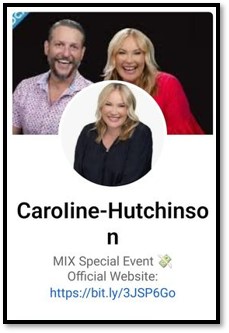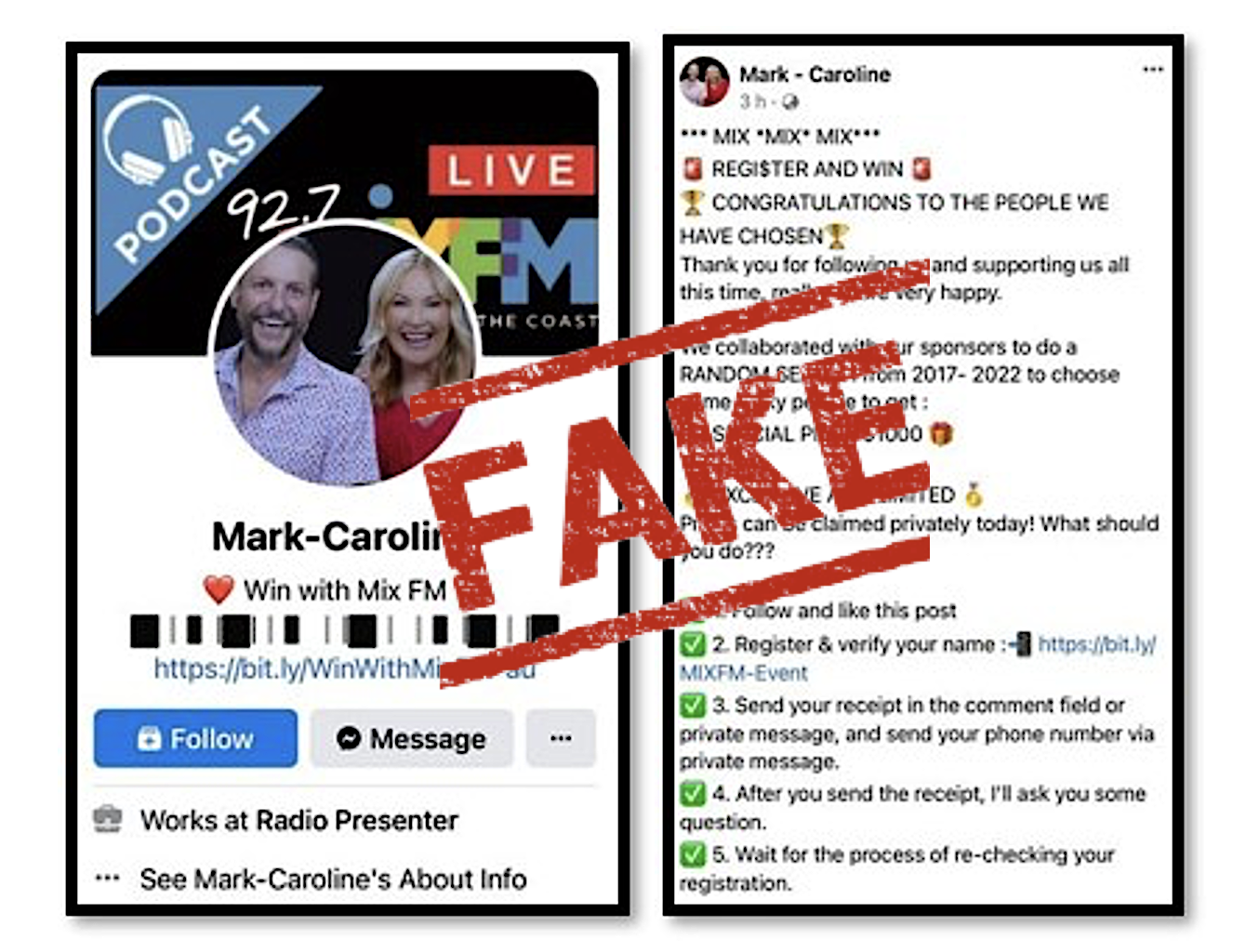Facebook Scammers are targeting radio stations and personalities.
This is how the scam works:
- The scammer creates a fake station or personality page, stealing logos and photos of the real stations or personalities without their permission
- The scammer’s fake profile may then post on the real station page about a competition, telling readers to go to their fake page for competition details
- Or, the fake page contacts people who have posted on the real station or personality’s page and tells them they have won a prize
- The scam relies on people trusting the station/person and clicking on a bit.ly shortlink or handing over their details so that the scammers can access their accounts or build up enough information to take advantage of them in some other way.
- The scammers seem to be particularly targeting older audiences
While investigating this scam over the past few weeks, radioinfo has learnt that most Australian radio stations are currently being targeted. Some don’t want to talk too much about it, while others are “shouting from the rooftops” because the threat to their listeners and their reputations is increasing.
Sunshine Coast stations 92.7 MIX FM and 91.9 SEA FM have been hit recently. The station’s Social Media Specialist Lachy Pugsley has told radioinfo:
Over the past month and a half, we have had a total of eight fake profiles that are pretending to be our announcers from both 92.7 MIX FM and 91.9 SEA FM. The fake profiles are:
-
- BarRat-Juelz
- Juelz-Jarry
- Elly-Chaney
- Mark-Caroline
- Caroline-Hutchinson
- Todd-Sami
- Juelz-Jarry (a second time)
- Mark-Caroline (a second time)
We have received numerous messages from our listeners asking if these profiles are ‘legit’ and to see if they have won the $1000 that these pages are promising. I have also had multiple phone calls from our listeners asking what to do when they have already handed over their card details.
Over the past two weeks, I have spoken to four different people explaining how to cancel their ‘subscription’ with these profiles and how to cancel their credit cards. One listener directly messaged Caroline Hutchinson and 92.7 MIX FM on Facebook and said: 
“Hi. Can you help me please? I had a message on a post regarding Caroline saying that I should go to her website as there was something there for me. When I went on it, it said that I was one of 20 that was chosen at random to win A$1000. Can you tell me if this is real as it seems to have disappeared from my Facebook page? Many thanks, Paula”
Paula then proceeded to hand over her credit card details to this website and has since seen money being deducted from her account.
Upon further investigation, we have seen that these scams are stealing our logos/intellectual property, previous posts on Facebook and Instagram, and stealing all of our talent photos, which is a breach of copyright.
Once we see one of these profiles pop up, we report it for ‘impersonating someone or a company’ to Facebook.
This is the standard reply we receive after reporting the fakes: “We have reviewed your profile that you reported for impersonating someone [Caroline-Hutchinson], and do not believe there is a breach”.
We also lodge reports through Google for the websites that are linked to these Facebook pages. These seem to be removed much quicker than the Facebook pages.
We don’t know what else we can do to stop these accounts. We have also attempted to email Facebook directly, but have still not heard anything from Facebook regarding these fake profiles.
Just this week top rating afternoon announcer on Melbourne’s Gold 104.3, Toni Tenaglia, also faced the same problem, and told our sister publication Radio Today of a similar story:
 She received a message from a listener checking whether Toni sent her a message on the station’s Facebook page telling her she had won a prize, directing the listener to the fake Toni Facebook page to claim it.
She received a message from a listener checking whether Toni sent her a message on the station’s Facebook page telling her she had won a prize, directing the listener to the fake Toni Facebook page to claim it.
To say Facebook was unhelpful would be an understatement, according to Toni. “I reported the account as ‘someone pretending to be me’ and – believe it or not – I never got a response from Facebook. I did receive emails saying friends had reported the page, because I had put up a post on MY Facebook page asking my friends to report it (yes I see the irony in this).”
While investigating the issue we contacted Facebook online but, like Mix and Sea, we received no response. Then we tried to find a contact number in Australia or America to ring Facebook’s parent company Meta directly – no luck. Then we contacted Ryan Moore in Meta’s Press Department through the company’s media section for a response to our questions about lack of responsiveness and failure to take down fake accounts in a timely manner… No reply.
There are several issue involved here: Fraud, breach of copyright and misleading business conduct.
Fraud: Is a police matter and a report to police will trigger any next actions. The ACCC, Scam Watch and Australia’s Cyber Crime Centre are other government bodies that may also get involved.
Copyright breaches: It is a copyright law issue in Australia, but Meta is based in America and outside normal Australian legal processes. Facebook has detection algorithms but is not using them to solve this problem.
As one station told us, “Facebook has detected, sent warnings and temporarily blocked some of our accounts if we accidentally put part of a song in a post and breach a singer’s copyright, this happens really fast… yet they are so slow at responding to our own copyright breach complaints when someone uses our logos and other copyrighted images.”
Misleading business conduct: Promising that the company will fix complaints about copyright, then not doing it is misleading. The scams themselves are deceptive conduct. The ACCC enforces that element of business law in Australia. The business regulator has previously sanctioned Facebook and is currently undertaking court action against it for other issues, but has not yet tackled this particular issue.
Media regulations: Australia’s media regulator has told radioinfo it has almost zero power to deal with social media. While the ACMA can deal with broadcast breaches and telephone scams, it has no jurisdiction with Facebook.
Communications Minister Paul Fletcher has told radioinfo that there is an expectation from the Australian government that platforms will be responsible and enforce their own terms of service.
“The Government expects platforms to enforce their own terms of service, which in many cases includes a real-name policy. In cases where a person uses a fake name to be abusive towards another person online, our Online Safety Act gives the eSafety Commissioner powers to unmask identifying information to issue the user with an end notice.
“In cases where a person uses a fake name and is defamatory online, our Government has introduced the Anti-Trolling Bill to make social media companies more accountable for defamatory comments from anonymous posters.
“Cases of financial fraud perpetrated online are police matters.”
radioinfo understands that Mix and Sea have reported these incidents to the police.
An ACCC spokesperson has told radioinfo that the competition and consumer regulator is currently pursuing legal action against Facebook/Meta for misleading and deceptive conduct for allowing currency scams that used the images of David Koch and Dick Smith to spread. The essence of the case is that Meta is responsible for those ads that it publishes on its platform. The ACCC’s ScamWatch offers advice for consumers and provides a mechanism to report scams.
The larger radio companies have generally had better success at getting Facebook to remove scam content, but they say it is like playing ‘whack a mole,’ with new scam pages popping up soon after one is deleted.
ARN has told radioinfo that this has been a problem in the past, “but a combination of our social media monitoring and data security protocols means any fake accounts are identified quickly. We are also very proactive in making our audience aware of the fake pages both on air and via social media.”
The company now has “a well-honed process in place for proving our ownership of the real accounts and representation of ARN talent, meaning that Facebook are quick to act and take down the fake accounts.”
ARN sees this issue as one of “misleading and deceptive conduct which misappropriates registered trademarks and brands and makes false representations about affiliations to ARN’s talent.”
In response to an increase in this activity, particularly across social media platforms, NOVA Entertainment “has implemented a range of monitoring methods which assist with identification and reporting.”
A NOVA Entertainment spokesperson has told radioinfo: “We particularly welcome the support we have received from Facebook in helping to shut down this abhorrent behaviour. We encourage everyone to remain vigilant and report instances of this misconduct.
“NOVA Entertainment takes matters relating to misleading or deceptive conduct, scams, and IP infringement very seriously given the harm it may cause to our valued listeners, employees and the general public.”
The networks say they are committed to working collaboratively with each other and Facebook to stamp out harmful activity. They are calling for stronger enforcement and takedown action to remove false and misleading information that has the capacity to deceive Australian online users.

